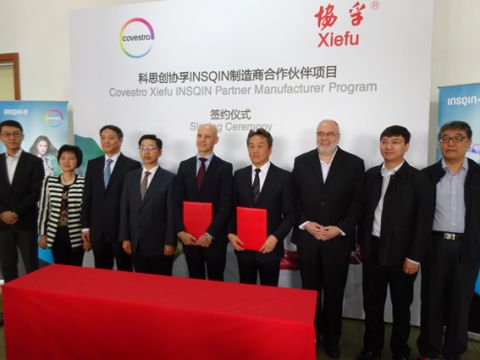 Company officials, representatives and invited dignitaries at the signing ceremony of the Covestro–Xiefu Insqin Partner Manufacturer Program in October 2015.
Company officials, representatives and invited dignitaries at the signing ceremony of the Covestro–Xiefu Insqin Partner Manufacturer Program in October 2015.Covestro of Leverkusen, Germany, a major supplier of polyurethane dispersions (PUDs) for the global textile coating industry, is continuing to develop its waterborne polyurethane (PU) technology (Insqin) for the technical textiles sector(1). The company is also launching new products with a high content of bio-based raw materials following increased market demands for sustainably manufactured goods, as well as innovation, from both producers and consumers.
With 2014 sales of €11.7 billion (up from €11.2 billion in 2013), Covestro is among the world’s largest polymer companies and the fourth largest chemicals producer in Europe. The company’s key products are PUs, polycarbonates and raw materials for coatings, adhesives and speciality chemicals. The main segments served are the automotive, electrical and electronics, construction, and sports and leisure industries.
Formerly Bayer MaterialScience, the company has been operating under the name of Covestro since 1 September 2015, and is now legally and economically independent, although remaining a subsidiary of the parent group, Bayer AG of Leverkusen(2).
With its headquarters in Leverkusen, the company currently has 30 production sites worldwide and employed around 14 200 people at the end of 2014. In its last financial year, ended 31 December 2014, Europe accounted for 38% of total sales, followed by Asia/Pacific (28%), North America (22%) and Latin America/Africa/Middle East (12%). In its former guise, the Bayer MaterialScience business unit reported earnings before interest, taxation, depreciation and amortization (EBITDA) of €1.19 billion (excluding non-recurring items) in 2014.
Further, Covestro raised €1.5 billion through an initial public offering (IPO) in early October 2015, when a 31% stake in the company was sold on the Frankfurt Stock Exchange.
Partner programme
A Chinese producer of PU-coated fabric, Kunshan Xiefu New Material of Kunshan, has now teamed-up with Covestro by signing-up to the Insqin Partner Manufacturer Program (IPMP). The two companies are collaborating to promote sustainable PU materials in technical textiles, including automotive interior materials, as well as such sectors as fashion apparel and footwear.
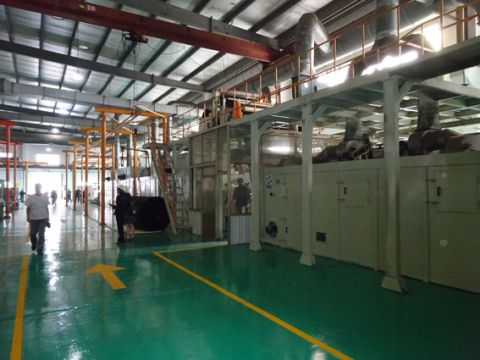 Kunshan Xiefu New Material has 15 production lines and an annual capacity of 40 million metres for synthetic leather products.
Kunshan Xiefu New Material has 15 production lines and an annual capacity of 40 million metres for synthetic leather products.Launched in July 2015, IPMP aims to connect manufacturers and brand owners across the supply chain for PU-coated fabric. Partners must demonstrate an ongoing commitment to sustainability and transparency, using Covestro’s waterborne PU coating technology and processes to meet the emerging sustainability needs of brand owners.
Xiefu is the second company to sign-up to the programme, after South Korean PU synthetic materials manufacturer Duksung of Seoul, South Korea.
Covestro’s Global Head of Textile Coatings, Nick Smith explained: “A growing number of brands and retailers are becoming interested in sourcing sustainable materials, and they need more assurances about the origins and integrity of those materials. The programme was developed to link these brands with manufacturers capable of efficiently delivering innovative materials and sustainability best practice.”
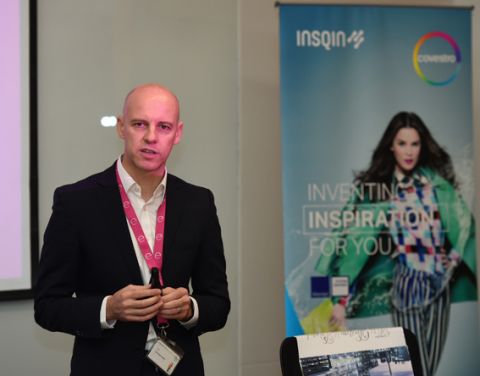 Nick Smith, Global Head of Textile Coatings, Covestro.
Nick Smith, Global Head of Textile Coatings, Covestro.Synthetic leather
Established in 1989 and occupying an area of 89 ha at its Seoul headquarters, Kunshan Xiefu New Material has 1000 employees and a total capital of Rmb320 million (about US$50 million).
With 15 production lines (mainly imported equipment and technology from Italy, Japan, South Korea and Taiwan), Xiefu has an annual capacity of 40 million metres. Processes include coating and electrostatic flocking of artificial leather with dry PU/polyvinyl chloride (PVC) and wet PU, as well as the manufacture of waterproof and breathable products.
The company’s products are widely used in the manufacture of electronic packaging, sports goods, fitness and medical equipment, automotive interiors, clothing, footwear, handbags, luggage, furniture and toys.
In 1993, Xiefu and Achilles of Tokyo, Japan, established a joint venture in Kunshan – Kunshan Achilles Artificial Leather – using Japanese equipment, processes and technology. Products include films, coatings, composite fabrics and synthetic leather for vehicles, yachts, motorcycles, skiing and mountaineering equipment, luggage, sports shoes and interior decoration.
Technical support
Under IPMP, Covestro will provide technical support to help Xiefu develop further its use of the Insqin technology. Xiefu will also receive verification of its production processes and management systems via a globally recognized third-party audit.
Kunshan Xiefu New Material Chairman, Sun Guohao said: “Xiefu is committed to customer-centric innovation and sustainability to serve the world’s most demanding brands. We are pleased to be recognized as a key partner of Covestro, with the technology, processes and skills to deliver exciting new PU products through sustainable manufacturing.
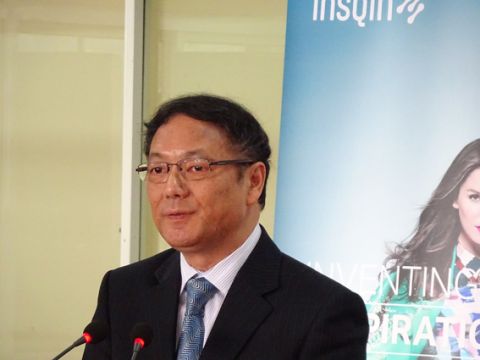 Sun Guohao, Chairman, Kunshan Xiefu New Material.
Sun Guohao, Chairman, Kunshan Xiefu New Material.“As a mark of our quality and professionalism, our validation as an Insqin Partner Manufacturer will help bring new business opportunities by connecting us with brand owners and retailers that want to source sustainable PU-coated materials.”
At the signing ceremony held in October 2015 in Kunshan, China, Smith said the partner programme had already received considerable interest from the apparel and footwear industry. As a result, Covestro plans to sign-up another producer in January 2016, followed by a further three in 2016; these will most likely be Chinese companies, he revealed.
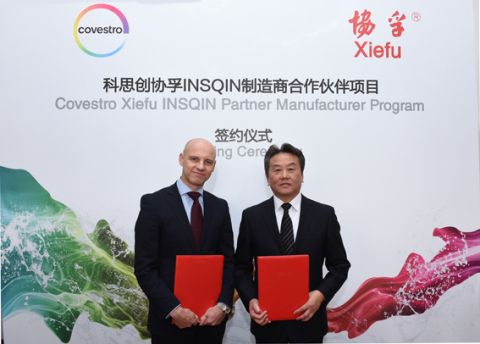 Nick Smith, Global Head of Textile Coatings, Covestro (left), and Xue Taiwen, General Manager and Director of Kunshan Xiefu New Material, after signing-up to the Insqin Partner Manufacturer Program.
Nick Smith, Global Head of Textile Coatings, Covestro (left), and Xue Taiwen, General Manager and Director of Kunshan Xiefu New Material, after signing-up to the Insqin Partner Manufacturer Program.Machinery range
Meanwhile, Covestro and Isotex Engineering of Trissino, Italy, part of the Tobel, Switzerland-based Santex Group, have announced a joint programme to develop and market technologies for PU synthetics, technical textiles, films and foams based on Insqin waterborne PU technology(3).
Under the agreement, Isotex Engineering machines will guarantee optimal production standards using Insqin technology. The company’s new machinery range will be designed for using this technology, together with process innovation from Isotex, to produce waterborne PU synthetic materials and other coated textiles.
Chinese focus
Covestro has had a strong focus in China for many years and currently has 2500 employees in the country. Shanghai has been one of the company’s three regional innovation hubs for more than 15 years and is classed as a strategic decision-making centre. Further, the company’s largest production site globally is located in China, near Shanghai.
Covestro’s textile coatings business unit is headquartered in Shanghai, where facilities include a state-of-the-art pilot line that can perform both wet and dry lamination; requiring an investment of €3 million, this was commissioned in April 2014.
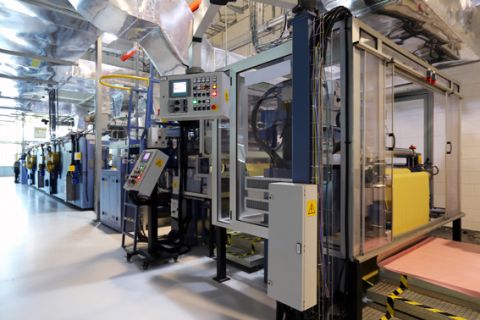 Covestro’s pilot coating line in Shanghai, China, which required an investment of €3 million, was commissioned in April 2014.
Covestro’s pilot coating line in Shanghai, China, which required an investment of €3 million, was commissioned in April 2014.It is estimated that PU-coated textiles have a current global market value of US$10 billion. Around 90% of this production is located in China, where some 500 producers operate 1500 production lines, principally in Zhejiang, Fujian, Jiangsu and Guangdong provinces, with an installed PU synthetic materials capacity of six billion metres and an annual production of four billion metres.
Insqin technology
Smith explained that with the Insqin (“inspiration in every square inch”) waterborne technology, the PU is delivered and processed without solvents. This provides several principal benefits:
- a safer working environment;
- less pollution;
- high efficiency, as textiles can be processed with 95% less water and 50% less energy compared with conventional technologies.
Further, the technology allows for product innovation, such as three-dimensional (3D) effect printing in fewer passes.
Covestro Textile Coatings’ Global Head of Application and Technology Development, Rolf Irnich explained that Insqin technology does not use dimethylformamide (DMF), a solvent associated with health risks to those exposed to it and pollution, as well as needing high amounts of water and energy during processing.
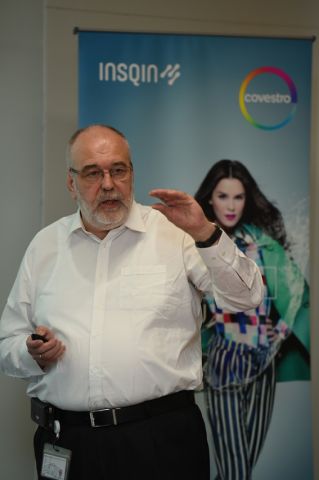 Rolf Irnich, Global Head of Application and Technology Development, Covestro Textile Coatings.
Rolf Irnich, Global Head of Application and Technology Development, Covestro Textile Coatings.In principle, Insqin can be used to coat any type of fabric substrate. Irnich added that foam plays a key role in this new, solvent-free technology: the base layer of the coating is created from a foam of waterborne PUD.
Renewable content
While Asia, and especially China, remains the major focus for Covestro’s textile coatings activities, the company is already well established in the technical textiles industry; for instance, its provides soil-resistant and scratch-resistant materials for automotive interiors.
In addition, in April 2015 the company introduced a range of waterborne, bio-based PUDs (Impranil Eco). These products are based on a renewable carbon feedstock – bio-succinic acid from BioAmber of Montreal, Quebec, Canada – which is derived from corn starch that is not produced in competition with the food chain. Impranil Eco products have a renewable content of up to 65%.
Smith explained that the price of oil is not the only factor in the choice of precursor for the manufacture of PU: “Size of the market and efficiency are also important,” he said. “However, the availability of bio-based raw materials is currently nowhere near the scale of fossil-based raw materials, so there has to be a wide range of polyols available.
“Bio-based raw materials also have to be in the right price range. While Covestro will not put a price premium on the new Impranil Eco products, these are not yet available in industrial quantities,” he stressed.
Tailored developments
In addition to the bio-based products, Covestro has launched further grades in the Impranil range:
- Impranil DLC-T makes is possible to produce automotive interior materials that combine the highly matted surfaces sought by the industry with the highest levels of abrasion-, hydrolysis-, light- and heat-resistance;
- Impranil DAA was developed for tie-coats in apparel and footwear applications, producing soft materials that retain this property even at low temperatures;
- Impranil DLE enables the development of upper materials for sports footwear that meet the highest industry specifications, particularly with respect to bonding strength.
